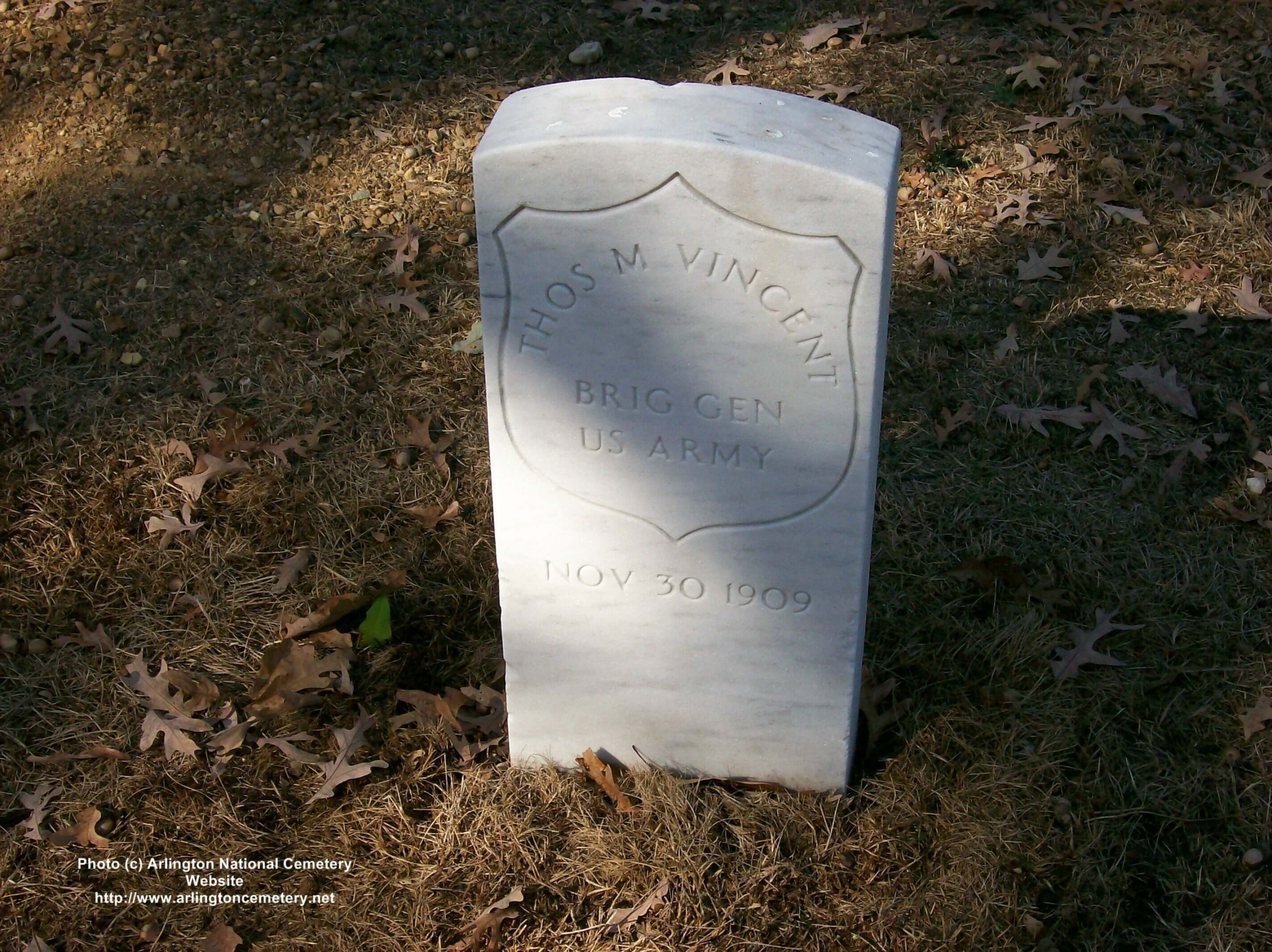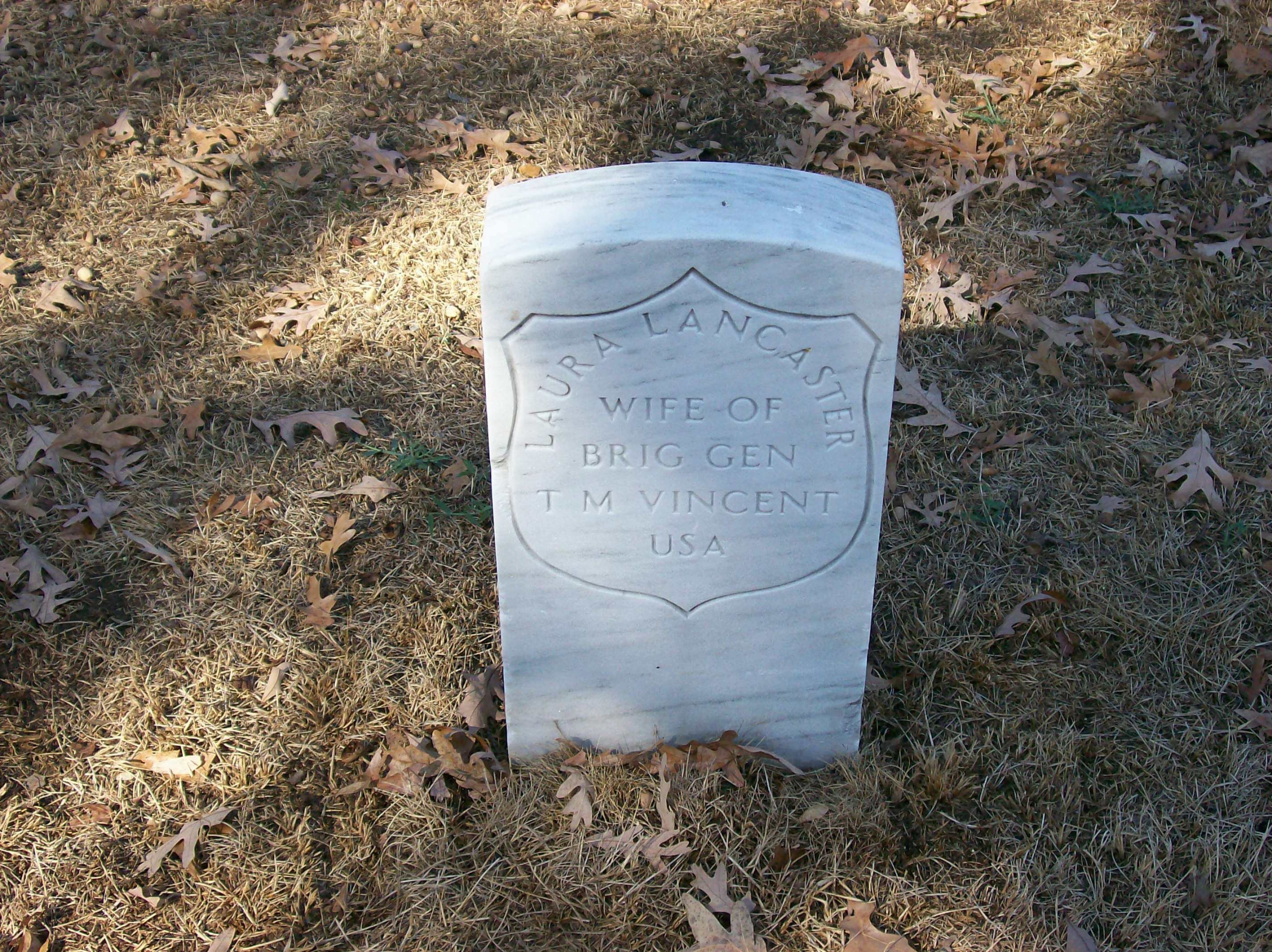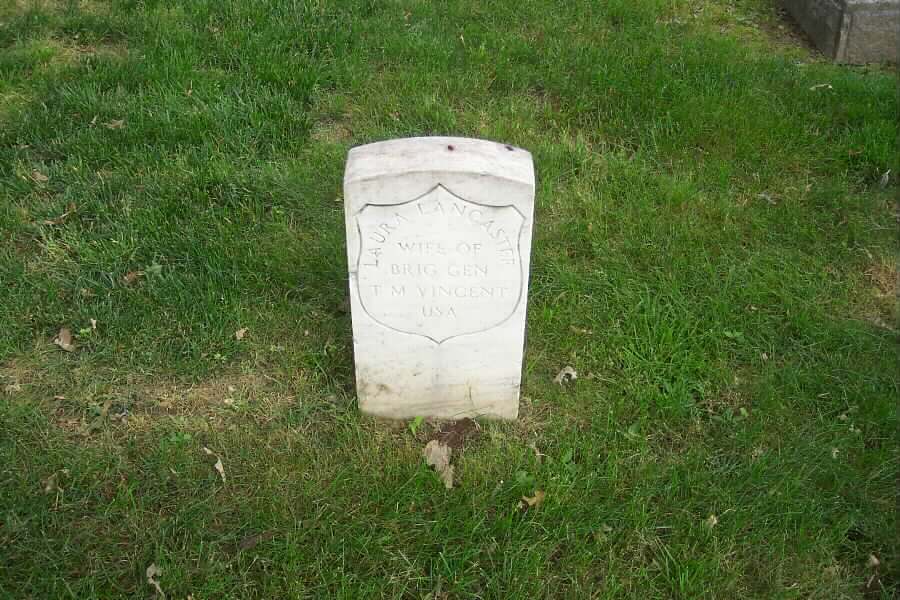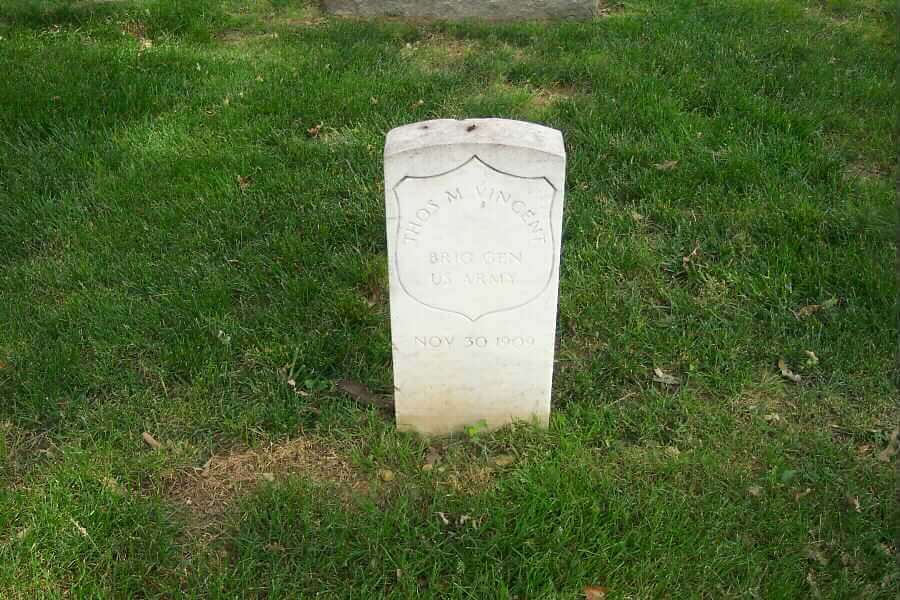Thomas McCurdy Vincent of Ohio
Appointed from Ohio, Cadet, United States Military Academy, 1 July 1849 (11)
Brevet Second Lieutenant, United States Artillery, 1 July 1853
Second Lieutenant, 8 October 1853
First Lieutenant, 20 October 1855
Regimental Quartermaster, 1 June to 1 July 1861
Captain, 25 July 1863 to 11 June 1864
Brevet Captain, Assistant Adjutant General, 3 July 1861
Captain, Assistant Adjutant General, 3 August 1861
Major, Assistant Adjutant General, 17 July 1862
Lieutenant Colonel, Assistant Adjutant General, 1 July 1881
Colonel, Assistant Adjutant General, 2 August 1890
Breveted Lieutenant Colonel and Colonel, 24 September 1864 for meritorious and faithful service during the war and Brigadier General, 13 March 1865 for faithful and meritorious service during the war.
Retired 15 November 1896
General Vincent died on 30 November 1909 and was buried in Section 1 of Arlington National Cemetery. His wife, Laura Lancaster Vincent is buried with him.
Courtesy of Appleton’s Encyclopedia:
Thomas McCurdy Vincent
VINCENT, Thomas McCurdy, soldier, born near Cadiz, Harrison County, Ohio, 15 November, 1832. He was graduated at the United States military academy in 1853, and on 8 October, 1853, became Second Lieutenant in the 2d artillery. During the three years that followed he served with his company in Florida during active operations in the field against hostile Indians, and from severe exposure in the line of duty became dangerously ill in May, 1855.
During his convalescence Lieutenant Vincent compiled a “Sketch of South Florida,” which was used by troops in the final operations pending the removal of the Indians, and for which he received the thanks of the General-in-Chief.
During the years 1855-56 he performed the duties of Assistant Adjutant General and Quartermaster and Commissary of Subsistence. He served with his company at Fort Hamilton and Plattsburg, New York, until August, 1859, when he was detailed as principal assistant professor of chemistry at the military academy.
Declining the appointment of captain in the 18th infantry, he was appointed assistant adjutant-general in July, 1861, and assigned to the Army of Northwestern Virginia, being engaged in the battle of Bull Run. In August, 1861, he became Captain, and in July, 1862, Major of staff. From 1861 until 1865 he was constantly on duty in the Adjutant General’s Office at Washington, particularly in charge of the “organization and miscellaneous business of the volunteer armies of the United States.”
Persistent applications for service in the field being disapproved by Secretary Stanton for the reason that “the public interests demanded his presence in the war department.” Not only did the responsibility for framing all the rolls and instructions issued for the government of the volunteer forces in service during the war, and the charge connected with a personnel of more than 90,000 commissioned officers, devolve upon General Vincent, but the preparation of the plan (of which he was also the sole author), and the immediate general direction of the work under it, for the muster-out and disbandment of the volunteer armies, numbering 1,034,064 officers and men, distributed to 1,274 regiments, 316 independent companies, and 192 batteries. This plan was prepared in advance of any notification from the secretary of war, and was put into execution immediately upon submission to that officer and General Grant.
Since the war General Vincent has been identified with all important changes in the methods of transacting the business of the war department, the revision of army regulations, and he has served as Adjutant General of various departments, and in September, 1888, was ordered to Washington on duty. He became Lieutenant Colonel and Assistant Adjutant General in July, 1881, and was brevetted to the grade of Brigadier General, United States army, “for faithful and meritorious services during the rebellion.”
General Vincent has made several reports to congress on “army organization,” and is the author of “The Military Power of the United States during the War of the Rebellion” (New York, 1881). His brother, Albert Oliver, soldier, born in Cadiz, Ohio, 7 February, 1842; died in St. Louis, Missouri, 9 December, 1882, was educated at common schools, and at the age of nineteen was about to establish himself as a printer, when, at the opening of the civil war, he was tendered by Sec. Cameron a commission as 2d lieutenant in the 2d artillery. From 1861 till 1866 he served with his battery, part of the time commanding it during all the operations of the Army of the Potomac, principally with horse artillery in conjunction with the cavalry, comprising thirty-five battles and minor affairs, besides continuous and rapid marches. He was commissary of musters and superintendent of volunteer recruiting service in 1865, and served with his regiment in California and Washington territory in 1865-‘7. He was brevetted captain for Antietam, major for Gettysburg, and lieutenant-colonel for faithful and meritorious services, 13 November, 1865, and declined the appointment of captain, 38th infantry, in July, 1866. He served as major of the 4th Arkansas cavalry in 1864-‘5, and was retired from active service in 1869.
GENERAL T. MCC VINCENT DEAD
Famous Indian Fighter and Organizer of Volunteers in Civil War
WASHINGTON, December 1, 1909 – General Thomas McCurdy Vincent, famous as an Indian fighter in the early fifties, and who was practically in charge of the organization of the volunteer army of the North during the Civil War, died at his home here yesterday, aged 77. He was the author of a number of books on military subjects. He will be buried at Arlington Cemetery here.
Michael Robert Patterson was born in Arlington and is the son of a former officer of the US Army. So it was no wonder that sooner or later his interests drew him to American history and especially to American military history. Many of his articles can be found on renowned portals like the New York Times, Washingtonpost or Wikipedia.
Reviewed by: Michael Howard




